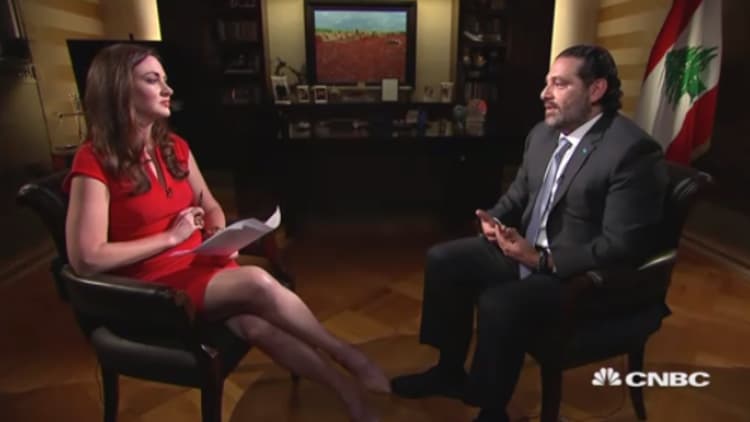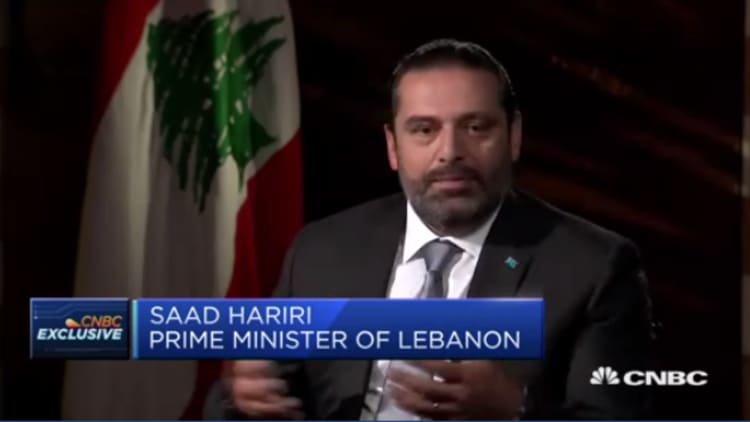BEIRUT — Lebanese Prime Minister Saad Hariri warned that austerity measures in the country would lead to public demonstrations, but said his approach to reform would not follow the tactics employed by other leaders in the region.
Lebanon is targeting a budget deficit of 7% next year, from 11.5% last year, in order to stabilize the country's economy and bring it back from the brink of collapse.
In order to enact the proposed reforms, the country will have to focus on austerity measures like a state hiring freeze and higher taxes on imported goods. These cuts could lead to demonstrations, the prime minister told CNBC's Hadley Gamble in an exclusive interview which aired Wednesday.
"Everyone is conscious there is a problem and everyone wants to take action. The issue is how to combine all our efforts in one big package of reform that will come with all the things we need to do. It's going to be tough but it's worth the time, the hours, the risk," he said in Beirut.
"We will have demonstrations in Lebanon, I'm saying it now. But we will have it one time, and that's it, fix it."
Hariri lauded the leaders of Saudi Arabia and Egypt for their focus on the potential of their respective countries. "This is when I commend what President (Abdel Fattah) Sisi is doing, in Egypt, what MBS (Crown Prince Mohammed bin Salman) is doing in Saudi Arabia. There is a lot of, you know, if you take the case of Egypt, how much Egypt is working on its economy, how much reform they are doing, how much they did in electricity, they did, this is what we need to do."

Since his rise to power, Saudi's crown prince has put forward an ambitious economic plan, dubbed "Vision 2030," which aims to increase foreign direct investment in the kingdom, increase non-oil revenue through sectors like tourism and increase the focus on the private sector.
In a region no stranger to demonstrations, reforms could come at a price for Lebanon. The Arab Spring, political conflicts throughout the Middle East and the collapse of the oil price in 2014 have put a strain on economies in the region. These factors have allowed other leaders in nations neighboring Lebanon to lead with a firm hand, in order to cement power and curb unrest.
Unlike Lebanon, Saudi Arabia and Egypt's leaders approach reform quite differently, and perhaps, Hariri noted, their approach wouldn't work in his own country.
"That's why we have to find the balance here in Lebanon, we cannot do this like everywhere else. But I believe in Lebanon we have this special equilibrium."

Lebanon's government has a power sharing agreement that dates back to the country's French colonial rule. It means that the president is a Maronite Christian, a position currently held by Michel Aoun. The agreement also means that the prime minister is a Sunni, Saad Hariri, and the speaker of parliament is a Shia.
In a country with 18 religious groups, all of which are represented in parliament, where sectarian divides are (usually) put aside in order to govern, ruling with an iron fist is not an option. The government and its leaders must make alliances with rival sects. Hariri noted that the country wasn't a mix of majorities and minorities: "We are all minorities in the country," he said.
Hariri's nod to Saudi Arabia comes as the country still awaits its loan payments, promised by the kingdom at the beginning of the year, which the prime minister said he was expecting soon. Getting the small Mediterranean economy out of its debt problems will mean many changes, but Hariri told CNBC he was prepared for that.


